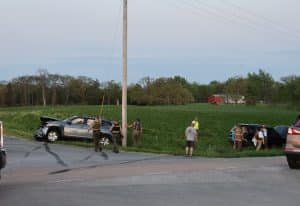The choice for Woods is drug-free

The Monroe County Coalition for Drug-Free Communities recently met for its first meeting of the year, welcoming a new executive director and setting goals for several years to come.
Kacie Woods started with the coalition as executive director in December, though she’s interacted with the organization in the past and has strong personal reasons to try and improve the community.
Woods has lived in Waterloo since she was a kid. Somewhat recently, she left her long-term career in an effort to pursue something she was more passionate about.
The coalition seemed like a nice fit given her prior interactions as she had previously run a support group with Human Support Services for individuals handling addiction with their loved ones.
Woods also spoke about her personal experiences and how addiction has affected her family.
“My brother battled addiction for a few years and then died of an overdose in 2012,” Woods said. “That kind of sparked my passion for all of this. And now I have four girls who I want to keep safe and on the right track. Helping the other youth in the community will also help my children.”
As has been discussed at several recent coalition meetings, the organization recently secured a substantial grant which has allowed them to further its efforts in the community.
HSS, as a nonprofit with substantial experience in applying for grants, served as the fiscal agent for this grant, applying and receiving the funds which it passed on to the coalition.
In particular, the coalition has been able to hire Woods in a position where she will oversee coalition activity and serve as a representative in the community, a substantial change from the many years in which the group has relied entirely on volunteers.
Woods explained her primary goal at the moment is to simply raise community awareness about the coalition.
“My first and main goal right now is to really get it out in the community that we exist, that this program exists, and how we can benefit the community, especially the youth,” Woods said. “Unless you’re dealing with something in the related fields, I’ve found a lot of people just didn’t even know it existed. I plan to be out in the community a lot so people can see us and learn more about us.”
Woods also explained she hopes to help the organization spread a particular message for its drug prevention efforts.
Rather than just offering blanket statements about drugs being bad, she hopes to help youth in the community understand what sort of harm drugs can cause for them.
She also mentioned that a big focus ought to be placed on mental health as a means of prevention, with mental health care and preservation in youth serving as a means of keeping them away from harmful substances and addiction.
Woods further spoke about Operation Snowball, a major prevention effort from the coalition, which places great emphasis on getting young people actively involved in drug prevention.
“Having been one of the D.A.R.E. kids growing up, that really wasn’t impactful in any sort of way,” Woods said. “But I think if we can really target some youth that actually care about a substance-free life and other students are hearing their own peers tell them why it’s a bad idea instead of just a police officer or teacher – someone who’s expected to give that information to them – to get it from their peers, I feel, will have more of an impact on them.”
Regarding the latest meeting, discussion throughout centered primarily around Project Snowball.
HSS President and CEO Anne Riley spoke about the leadership camps that are a major part of the program.
“I think one of the things I’m most excited about with Operation Snowball and the camp… it really gets the youth involved in a meaningful way,” Riley said. “For all the years that we’ve been working in this coalition, we’ve always wanted youth to be more involved than we ever could manage to get them involved.”
These camps, as it was noted at the meeting, involve students taking on a number of leadership responsibilities, including looking at information collected from surveys conducted in local schools and considering how to put it to use in much the same way that the coalition has done for many years now.
Another topic of conversation pertaining to Operation Snowball involved how to get student organizations focused on drug and addiction prevention started in local schools.
It was noted that it is easier to begin building these sorts of groups at younger grade levels like middle school.
At the high school level, some schools in the area already have student organizations with this sort of focus, though Woods acknowledged that the coalition could reach out to social workers in local schools to get an idea of what students might be interested in starting an organization.
Discussion also touched on community engagement and awareness, with Bill Rebholz – a longtime member of the coalition – pointing to Woods as a major boon for this effort.
Later in the meeting, Rebholz also led a conversation regarding the aforementioned youth survey.
He noted how, with this survey being conducted every two years, it provides a sort of snapshot for students as they grow.
Rebholz referenced the latest survey results – those from 2022 – as he spoke.
“Marijuana and alcohol continue to be the two more troubling things for our kids,” Rebholz said. “It’s not so much, for example, pain meds or things like that, though there’s a little bit of activity there.”
Regarding alcohol, he said much of society largely seems to be OK with young people drinking, from alcohol at parties to adults providing minors with drinks. He suggested that there likely needs to be a large change in the culture to address this problem.
Rebholz also pointed out how marijuana use might have changed given its legal status and wider acceptability in the culture compared to 2022.






